最易混淆的英语短语汇总
容易混淆的英语短语
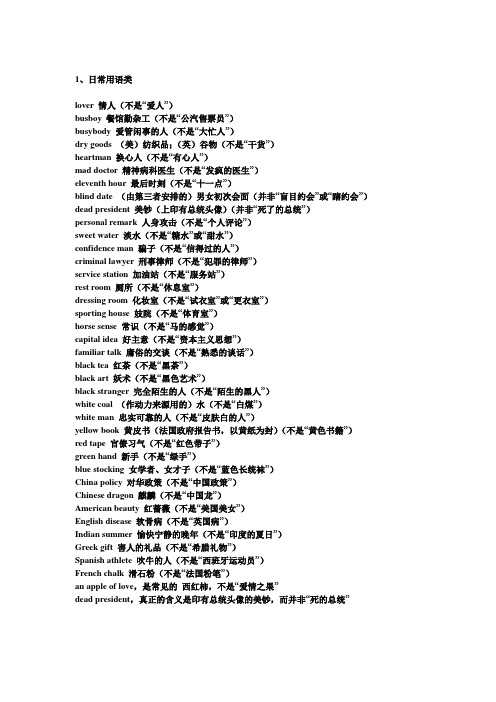
1、日常用语类lover 情人(不是“爱人”)busboy 餐馆勤杂工(不是“公汽售票员”)busybody 爱管闲事的人(不是“大忙人”)dry goods (美)纺织品;(英)谷物(不是“干货”)heartman 换心人(不是“有心人”)mad doctor 精神病科医生(不是“发疯的医生”)eleventh hour 最后时刻(不是“十一点”)blind date (由第三者安排的)男女初次会面(并非“盲目约会”或“瞎约会”)dead president 美钞(上印有总统头像)(并非“死了的总统”)personal remark 人身攻击(不是“个人评论”)sweet water 淡水(不是“糖水”或“甜水”)confidence man 骗子(不是“信得过的人”)criminal lawyer 刑事律师(不是“犯罪的律师”)service station 加油站(不是“服务站”)rest room 厕所(不是“休息室”)dressing room 化妆室(不是“试衣室”或“更衣室”)sporting house 妓院(不是“体育室”)horse sense 常识(不是“马的感觉”)capital idea 好主意(不是“资本主义思想”)familiar talk 庸俗的交谈(不是“熟悉的谈话”)black tea 红茶(不是“黑茶”)black art 妖术(不是“黑色艺术”)black stranger 完全陌生的人(不是“陌生的黑人”)white coal (作动力来源用的)水(不是“白煤”)white man 忠实可靠的人(不是“皮肤白的人”)yellow book 黄皮书(法国政府报告书,以黄纸为封)(不是“黄色书籍”)red tape 官僚习气(不是“红色带子”)green hand 新手(不是“绿手”)blue stocking 女学者、女才子(不是“蓝色长统袜”)China policy 对华政策(不是“中国政策”)Chinese dragon 麒麟(不是“中国龙”)American beauty 红蔷薇(不是“美国美女”)English disease 软骨病(不是“英国病”)Indian summer 愉快宁静的晚年(不是“印度的夏日”)Greek gift 害人的礼品(不是“希腊礼物”)Spanish athlete 吹牛的人(不是“西班牙运动员”)French chalk 滑石粉(不是“法国粉笔”)an apple of love,是常见的西红柿,不是“爱情之果”dead president,真正的含义是印有总统头像的美钞,而并非“死的总统”2.成语类pull one's leg 开玩笑(不是“拉后腿”)in one's birthday suit 赤身裸体(不是“穿着生日礼服”)eat one's words 收回前言(不是“食言”)an apple of love 西红柿(不是“爱情之果”)handwriting on the wall 不祥之兆(不是“大字报”)bring down the house 博得全场喝彩(不是“推倒房子”)have a fit 勃然大怒(不是“试穿”)make one's hair stand on end 令人毛骨悚然—恐惧(不是“令人发指——气愤”)be taken in 受骗,上当(不是“被接纳”)think a great deal of oneself 高看或看重自己(不是“为自己想得很多”)pull up one's socks 鼓起勇气(不是“提上袜子”)have the heart to do (用于否定句)忍心做……不是“有心做”或“有意做”)look out,是当心,不是“往外看”3.表达方式类Look out! 当心!(不是“向外看”)What a shame! 多可惜!真遗憾!(不是“多可耻”)You don't say! 是吗!(不是“你别说”)You can say that again! 说得好!(不是“你可以再说一遍”)I haven't slept better. 我睡得好极了。
容易混淆动词短语总汇
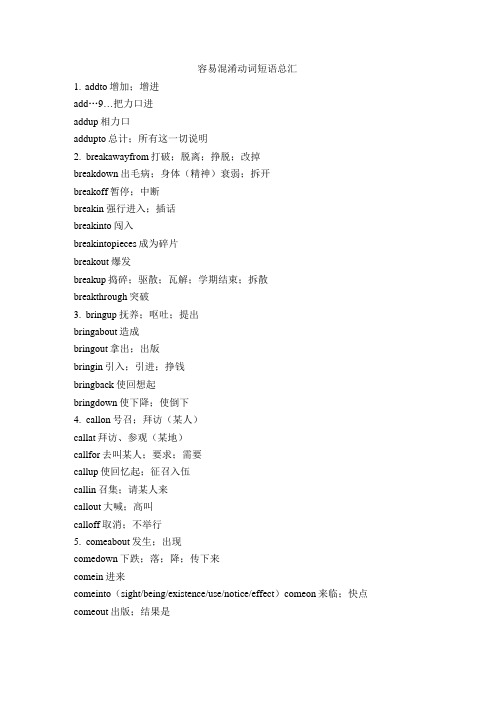
容易混淆动词短语总汇1.addto增加;增进add…9…把力口进addup相力口addupto总计;所有这一切说明2.breakawayfrom打破;脱离;挣脱;改掉breakdown出毛病;身体(精神)衰弱;拆开breakoff暂停;中断breakin强行进入;插话breakinto闯入breakintopieces成为碎片breakout爆发breakup捣碎;驱散;瓦解;学期结束;拆散breakthrough突破3.bringup抚养;呕吐;提出bringabout造成bringout拿出;出版bringin引入;引进;挣钱bringback使回想起bringdown使下降;使倒下4.callon号召;拜访(某人)callat拜访、参观(某地)callfor去叫某人;要求;需要callup使回忆起;征召入伍callin召集;请某人来callout大喊;高叫calloff取消;不举行eabout发生;出现comedown下跌;落;降;传下来comein进来comeinto(sight/being/existence/use/notice/effect)comeon来临;快点comeout出版;结果是comealong一道来;赶快cometo达至U(anend/anagreement/astop)苏醒;合计;总共是comeover走过来comeup发芽;走近comeacross偶然碰到comeback回想起comefrom来自;源自6.cutacross抄近路cutdown砍倒;削减cutoff切断;割掉;断绝关系cutup连根拔除;切碎through剪断;凿穿cutout删(省)掉;戒掉cutin插嘴7.dieof(disease/hunger/grief/oldage)死于(疾病、饥饿、寒冷、情感原因)diefrom死于(意外事故、情形)dieaway渐渐消逝dieout绝种diedown(炉火)渐熄dieoff逐一死去8.fallbehind落后falloverone’sfeet跌跤falldown掉下;跌倒fallback撤退;后退9.goinfor从事;喜爱;参加gothrough通过;经受goover复习;检查goup(价格)上涨;建造起来goafter追捕;追赶goagainst违反goahead先行;开始吧;问吧;说吧goaway离开goby时间过去godown下沉;降低;(日、月)西沉goon(with)继续进行gowith相配;陪同gowithout没有;缺少goout外出;熄灭goallout全力以赴gooff爆炸;进行;变坏;断电;停止供应gobackon背约;食言gobeyond超出10.getdown下来;记下;使沮丧getdownto致力于;专心于geton进展;进步;穿上;上车getoff脱下;下车getin收集;插(话)getaway逃跑;逃脱;去休假getover忘记;越过;克服;从疾病中恢复getalongwith进展;相处getup起床getthrough打通电话;完成;通过getround消息传开getclosetosth.接近;几乎getinto(trouble)陷入(麻烦)getto(know)逐渐(知道)getback取回;收回11.giveaway赠送;泄露;出卖giveout发出;疲劳;分发;公布giveoff发出(光、热、气体)givein(tosb.)屈服giveup放弃;让(座位)12.handin交上;提交handout分发handdown流传;遗传13.hangabout闲逛hangup挂电话14.holdback阻止;隐瞒holdup举起;使停顿holdon别挂电话;等等;坚持holdout持续;坚持;伸出holddown控制;镇压15.keepup(courage,spirits)保持(勇气、精神)keepupwith跟上keepoff(grass)不接近;离开keepawayfrom避开;不接近;离远远的keepoutof不让……进入……keepto(rules,promise)坚持、遵守(规则、诺言)keepon继续;坚持下来keepback阻止;留下;隐瞒;扣下keepfrom克制;阻止16.knockat/on敲knockinto撞到某人身上knockdown撞倒knockoutof把敲出knockover撞倒knockoff停止工作;休息17.leavefor离开前往leaveout删去;遗漏leavebehind遗留;忘记拿走leaveto留给;遗嘱赠于leaveover遗留;剩下;延期18.lookup查找;向上看lookthrough翻阅;浏览lookon旁观lookon…as看作……lookinto调查lookafter/at/for照顾/看/寻找look。
中考易混淆单词
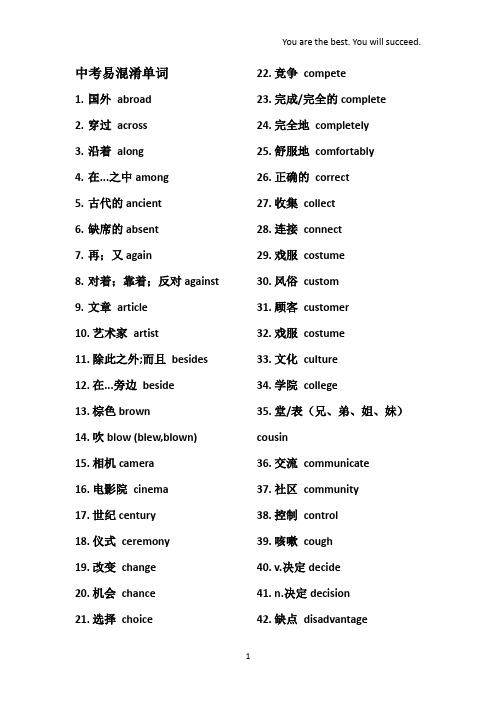
You are the best. You will succeed.中考易混淆单词1.国外abroad2.穿过across3.沿着along4.在...之中among5.古代的ancient6.缺席的absent7.再;又again8.对着;靠着;反对against9.文章article10.艺术家artist11.除此之外;而且besides12.在...旁边beside13.棕色brown14.吹blow (blew,blown)15.相机camera16.电影院cinema17.世纪century18.仪式ceremony19.改变change20.机会chance21.选择choice 22.竞争compete23.完成/完全的complete24.完全地completely25.舒服地comfortably26.正确的correct27.收集collect28.连接connect29.戏服costume30.风俗custom31.顾客customer32.戏服costume33.文化culture34.学院college35.堂/表(兄、弟、姐、妹)cousin36.交流communicate37.社区community38.控制control39.咳嗽cough40.v.决定decide41.n.决定decision42.缺点disadvantageYou are the best. You will succeed.43.挖dig(dug, dug)44.邀请invite45.发明invent46.邀请invitation47.发明invention48.分开divide49.电electricity50.电的electric51.电子的elcetronic52.实验experiment53.经验;经历experience54.尤其;特别especially55.确切地exactly56.极好的;优秀的excellent57.除了except58.期望expect59.表达express60.表现behave61.表扬perform62.渔夫fisherman63.第四fourth64.十四fourteen 65.第四十fortieth66.法语/法国人的French67.法国France68.外国人foreigner69.花园garden70.地理geography71.毕业graduate72.逐渐地gradually73.大体的general74.客人guest75.门卫;士兵guard76.导游guide77.德语/德国人的German78.德国Germany79.习惯habit80.爱好hobby81.幽默的humorous82.高度height83.重量weight84.加热heat85.心脏heart86.拥抱hug(hugged,hugged)87.隐藏hide(hid,hidden)88.放;下(蛋)lay( laid, laid)89.躺lie (lay, lain)90.撒谎(lied,lied)91.邀请invite92.发明invent93.产业;工业industry94.面试;采访interview95.介绍introduction96.指示;指令instruction97.立刻immediately98.日语/日本人的Japanese99.模型model100.中间的middle101.嘴巴mouth102.月month103.老鼠mouse104.钱money105.猴子monkey106.奖牌medal107.铁的metal108.精神上的mental 109.医学的medical110.药medicine111.机器machine112.材料material113.第九ninth114.九十ninety115.(两者)都不neither 116.(三者以上)都不none 117.第九十ninetieth 118.乘客passenger119.段落/走廊passage 120.合适地properly121.可能地possibly122.可能地probably123.承诺promise124.产品product125.英镑pound126.骄傲的proud127.骄傲n. pride128.小学生pupil129.紫色purple130.价格price131.奖品prize132.表扬;赞扬praise 133.星球planet134.种植/植物plant 135.荣幸;快乐pleasure 136.完美的perfect 137.耐心的patient 138.有礼貌的polite 139.飞行员pilot140.准备prepare 141.更喜欢prefer 142.预防prevent 143.保护protect144.污染pollute145.生产v. produce 146.过程n.process 147.十分quite148.安静的quiet 149.收到receive150.意识到realize 151.提醒remind152.复习,回顾review 153.害怕的(形容人)scared 154.害怕的(形容物)scary 155.酸的sour156.咸的salty157.糖sugar158.卖;销售n.sale159.卖;销售V.sell160.v.服务serve161.n.服务service162.n.仆人servant163.围巾scarf164.分离separate165.小吃,零食snack 166.蛇snake167.标准standard168.严格的strict169.严肃的,认真的serious 170.象征symbol171.标志sign172.社会society173.社会的social174.偷steal(stole, stolen)175.摇晃shake(shook,shaken) 176.传播spread177.速度speed178.猜想;设想suppose 179.支持support180.建议suggest181.成功v.succeed182.成功n.success183.通过through184.虽然though/although 185.扔throw (threw, thrown) 186.周二Tuesday187.周四Thursday188.十三thirteen189.三十thirty190.十二twelve191.第十二twelfth192.朝;向toward(s)=to 193.向前forward194.厕所toilet195.珍宝treasure196.雨伞umbrella 197.大学university 198.参观者visitor 199.视频;录像video 200.周三Wednesday 201.天气weather 202.是否whether。
容易混淆的英语短句
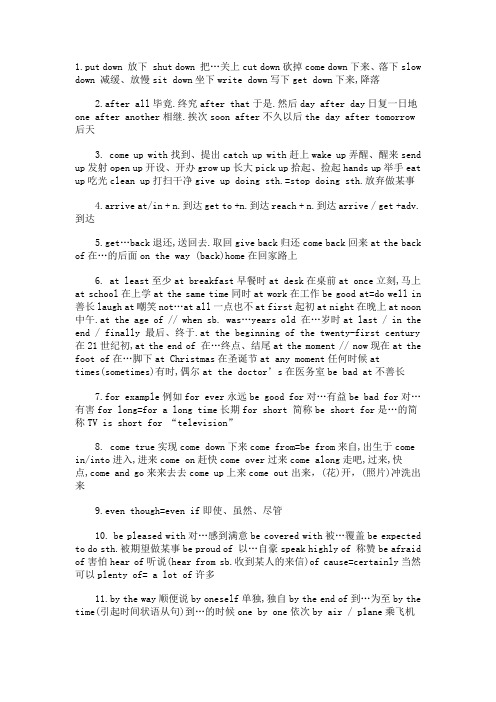
1.put down 放下 shut down 把…关上cut down砍掉come down下来、落下slow down 减缓、放慢sit down坐下write down写下get down下来,降落2.after all毕竟.终究after that于是.然后day after day日复一日地one after another相继.挨次soon after不久以后the day after tomorrow 后天3. come up with找到、提出catch up with赶上wake up弄醒、醒来send up发射open up开设、开办grow up长大pick up拾起、捡起hands up举手eat up吃光clean up打扫干净give up doing sth.=stop doing sth.放弃做某事4.arrive at/in + n.到达get to +n.到达reach + n.到达arrive / get +adv.到达5.get…back退还,送回去.取回give back归还come back回来at the back of在…的后面on the way (back)home在回家路上6. at least至少at breakfast早餐时at desk在桌前at once立刻,马上at school在上学at the same time同时at work在工作be good at=do well in 善长laugh at嘲笑not…at all一点也不at first起初at night在晚上at noon 中午.at the age of // when sb. was…years old 在…岁时at last / in the end / finally 最后、终于.at the beginning of the twenty-first century 在21世纪初,at the end of 在…终点、结尾at the moment // now现在at the foot of在…脚下at Christmas在圣诞节at any moment任何时候attimes(sometimes)有时,偶尔at the doctor’s在医务室be bad at不善长7.for example例如for ever永远be good for对…有益be bad for对…有害for long=for a long time长期for short 简称be short for是…的简称TV is short for “television”8. come true实现come down下来come from=be from来自,出生于come in/into进入,进来come on赶快come over过来come along走吧,过来,快点,come and go来来去去come up上来come out出来,(花)开,(照片)冲洗出来9.even though=even if即使、虽然、尽管10. be pleased with对…感到满意be covered with被…覆盖be expected to do sth.被期望做某事be proud of 以…自豪speak highly of 称赞be afraid of害怕hear of听说(hear from sb.收到某人的来信)of cause=certainly当然可以plenty of= a lot of许多11.by the way顺便说by oneself单独,独自by the end of到…为至by the time(引起时间状语从句)到…的时候one by one依次by air / plane乘飞机by bus / train / car乘公共汽车/火车/轿车(catch a bus赶公交车get on / off the bus上/下车take a bus to…=go to …by bus乘车去)12.do / try one’s best尽力do one’s homework做家庭作业do (the/some) shopping购物do the cooking烹饪do some cleaning打扫do the / some washing 洗衣服do sport做运动do with sb / sth.处理well done干得好(From:)13.early in the morning一大早in the early spring初春in my early days 我幼年时期early bus早班车14.make a contribution to贡献给、捐献make a telephone call to sb. // ring sb. up // give sb. a call // phone sb.给某人打电话connect…to…把…与…连接起来be close to靠近(某地) give birth to生(孩子) lose to sb 输给sb .15.either…or…或者…或者..on either side of the street街道任何一边(on each side of the street街道每一边on both sides of the street街道两边)16.keep doing sth.不停地做某事(表示状态继续)keep on doing sth. 坚持做某事(表示动作反复进行)practise doing sth.练习做某事enjoy doing sth.喜欢做某事finish doing sth.做完某事go on doing sth.继续做某事(同一件事)17.go on to do sth.接着做某事(另一事) go straight along 沿着…一直往前走, go down下降, go for a walk散步, go over复习, go shopping买东西, go to the cinema去看电影, go well进展顺利, go off to动身前往, go out外出 , go to work去上班, go up上升, want a go 想试一试18. think about考虑 (think of 认为、想起、考虑、想到 think over仔细考虑 think out想出)talk about谈论, worry about担心, How / What about…?…怎么样?19.borrow…from …从…借….(lend…to…把…借给…)from door to door 挨家挨户 , from time to time时时, from now on 从今以后 , from then on 从那以后, be different from与…不同, learn…from…向…学习20.get dressed穿衣 , get into进入, get / be lost丢失, get off / on 下/上车 , get on well with sb.与某人相处得好, get out of从…出来 , get ready for +n.为…做准备, get ready to do sth.准备做某事, get / go to sleep (fall asleep)入睡 , (be asleep睡着) get warm 变暧 , get well康复, get a chance 有机会、得到机会21. look for 寻找 , wait for等候 , look after=take care of照看, look like看起来像 , look over检查,复习 , look out小心,从里向外看 , look the same看起来一样, look up向上看,查单词 , look around环视look forward to 期望 , look through温习,检查22. set off 出发、动身, put off 推迟 , keep off 避开、不靠近… drop off放下(某物),turn off关 , jump off跳离 , take off脱(衣),(飞机)起飞(From:)23. half a kilo半千克 , half an hour半小时 , in half分成两半, half of the day半天24. do eye exercises做眼保健操 , do morning exercises做早操take (more) exercise (多)参加体育锻炼 , an exercise book练习本25. take part in参加 , hand in上交 , in hospital住院 , in surprise 吃惊地 , in the sun在阳光下 , in trouble处于困境, in a minute / moment 马上26. leave for…动身去某地27 feed on 以…为主食 , live on继续活着 , base on以…为根据 , carry on坚持、继续下去 , and so on 等等 , on the other hand另一方面 , on foot 步行 28.be famous for以..著名 , be excited about +n./V-ing对…感到兴奋 , be interested in 对…感兴趣 , be born出生 , be busy with sth.— be busy doing sth.忙于…be amazed at 对..感到惊讶29.move away移开 , move to(搬)移到30.search the Internet上网31.make sure 确信 , make a dialogue编对话 , make a mistake犯错误 (by mistake由于疏忽) make a noise吵闹 , make faces做鬼脸 , make friends (with)和..交朋友 , make room for给..让地方, make tea沏茶, make money 赚钱, make a decision作出决定ed to do sth过去常常做某事, be used to doing sth.习惯于做某事33. leave sth+介词短语“把……忘记在某处”34.forget to do sth.忘记做某事 , encourage sb. to do sth.鼓励某人做某事 , decide to do sth.决定做某事 , allow sb. to do sth.允许某人做某事35.hear sb. to do (doing)sth.听见某人做某事36.help sb. (to) do sth .//help sb. with sth. 帮助某人做某事 , with one’s help在某人的帮助下 , with pleasure乐意37.the summer holiday(s)暑假 the winter holiday(s)寒假38.step into走进 , pour into倒入…39.in the first第一 , for the first time第一次, at first起初 , a firs t language母语 , first of all首先40.leave a message for sb.给某人留条, give / take sb. a message给某人捎口信41. take photos / pictures 照像 , take away拿走 , take out取出 (work out算出) take care当心 , take medicine 服药 take one’s temperature 量体温, take one’s time别着急 , take a walk散步 , take place发生42. learn by oneself / teach oneself自学 , learn by heart背熟43. a year and a half (one and a half years ) 一年半44.have a try尝试,努力 , try out尝试、试验 , find out / about找出,查明, have a good / wonderful / great / time玩得开心, have a (bad) cold(重)感冒 , have a meeting / walk / watch开会/散步/比赛 , have sports 进行体育活动 , have nothing / sth. to do with与..无(有)关 , have no idea 不知道, have (one’s) medicine服药45. offer sb sth.给某人提供某物46.win first prize获一等奖47.all over the world= around the world =throughout the world全世界48. all kinds of 各种各样的49. neither… nor 既不…也不….50. not only … but also …不但…而且, both… and ……和…都51. the more , the better 越多越好52. all one’s life 一生53. as soon as 一…就… as soon as pos sible尽可能早地、尽快as well = too也, as much as至多, as little as至少, regard …as 把…当作… , as if 好像54. no matter 无论…55 ever since 从那以后,此后一直56.so far 到目前为止 , or so大约57. another two hours (=two more hours )又(再) 2个小时58. three times a week一周三次59. the numb er of…的数量 a (large / good) number of / large numbers of / many许多60.less than少于 , less and less 越来越少61.…is another way of saying…什么是..的另一说法 Quick is another way of saying fast. Bike is short for bicycle.62. not…until…直到…才…63.be like像 , feel like +n./V-ing想要 , like best最喜欢 , would like to 想要64.the 24 hour clock 24小时制65.wash away冲走,run away逃跑 , take away带走66.before long不久 , long before / ago很久以前 , for long =for a long time长期, no longer = not. .any longer不再67.more or less = about或多或少,大约more than = over多于,超过68.every year每年 , every four years每隔四年 , every other day每隔一天 , everyday English / life日常英语/生活69. next to紧挨着, next door隔壁,邻居 , next year明年 , next time 下次70.receive / get / have a letter from sb. = hear from sb 收到某人的来信71.on show = on display展览72.be filled with / be full of充满…73. thank to =because of由于74.some day =one day(将来)某一天 , all day终日, day and night 日日夜夜 , in a day or two一两天内 in the old days从前,旧社会, from day to day (day after day)日复一日 , the day before yesterday前天 , the day after tomorrow后天, Tree Planting Day植树节, Women’s Day 妇女节75. keep / stop / prevent… (from) doing sth.防止(阻止)…做某事 , stop to do sth.停下来去做某事 , stop doing sth.停止做某事76.nice and +adj. = very +adj.很,非常77. a place (places) of interest 名胜78.three quarters of the information on the Internet因特网上四分之三的信息 , two thirds of the books三分之二的书79. credit card信用卡80. the increasing population增长着的人口81 a path of travel旅行路线82 . point at / to指向83. by sea = by ship乘船 , by the sea = on the sea 在海边, at sea 在海上84. set one’s mind to do sth.一心想做某事85 .multiply…by…乘以…86. See you!再见 You see.你知道,你明白,你瞧 , Let me see.让我想想, see sb. off给某人送行 , see a / the doctor看病, see sb . do / doing sth.看见某人做某事87 some…others一些(人,物)…其他(人,物) one…another一个..另一个(三者或以上) one…th e other一个…另一个(总数二个)88. be worn out穿旧,磨坏 , check out核实,检查 , write out写出 , take sth. out of从…拿出/取出某物89. in this way用这种方法, in a few year’s time几年以后 , in space 在太空 , in and out of class在课内课外 , in the last fifteen minutes 在最后十五分钟里 , in the second half 在下半场, later in one’s life 在某人后半身 , in the air在空中 , in the open air在户外90.give sb. an injection给某人打针 , get an injection打针91.have been to去过某地 , have gone to到某地去了92.here + be+ 名词+ for+某人 ( Here is a letter for you.这儿有你的一封信.)93.be far behind +某人 (He is far behind others. 他落后于别人)94. one of + adj.最高级+复数名词95. take +某物+with +某人(You’d better take an umbrella with you.你最好带上雨伞)96. prefer to= like…better than宁愿,更喜欢prefer + V-ing (to do sth.) ( I prefer doing (to do) it myself .我喜欢自己做那件事). Would / should 等情态动词 + prefer +不定式. (I would prefer to do it myself.我宁愿自己做那件事) , prefer +名词(v-ing) + to+名词 (v-ing) (I prefer learning English to playing football.我愿意学英语而不愿踢足球) ; prefer +不定式(名词)+ rather than + 不带to的不定式, (I prefer to walk there rather than go by bus.我喜欢走着去那里,而不愿乘车) , prefer + 名词(代词) to do sth. (We prefer her not to come.我们宁愿她不来)97. 人+ spend +time (money) +(in) doing sth. (I spent over two hours (in) finishing my homework.我花了两个多小时完成家庭作业.) , 人 + spend + time (money) + on +名词, (He spent 1,000 on the TV set .他花了一千元买电视机). 人 + pay + money +for +sth. ( He paid ten yuan for the book .他花了10元钱买那本书.) It + takes (will take, / took…) + sb. + time (money) + to do sth. (It’ll take you only ten minutes to get there by bus.乘车去那里只花你10分钟). 物+ cost + (sb.) + money, (The dictionary cost me 20 yuan .我花20元钱买了那本词典)98. do with + sb. / sth. (What have you done with the pork ? 那些肉你怎么处理了?)99. mind + if 从句, (Do you mind if I open the window?我开窗你不反对吧?) mind + V-ing, (Would you mind turning on the TV?打开电视你不反对吧?)100. what…for? /why…? (What do you learn English for? = Why do you learn English?)101. need + 名词 (v-ing), (The students need some help.学生们需要帮助.This pair of shoes needs mending.这双鞋需要修理)102. “be used for+ 名词(v-ing),”被用来做.. (A writing brush is used for writing.) “be u sed as+名词”, 被作为…使用 (English is used as thefirst language in none of these countries. ) “be used by+动作执行者”, 被…使用,103.be made of 由…制造(This table is made of wood .这张课桌是木制的) be made from由…制成 (This kind of paper is made from wood . 这种纸是用木材制成的) be made in+地点, “某地制造”(These cars are made in Germany) be made by+人, “由谁制造的” (This kite is made by Kate . )104. more developed countries发达国家, less developed countries不发达国家, developing countries发展中国家105.be worth + money (V-ing),值…钱.值得做…This car is worth more than two million yuan in China. This book is well worth reading.这本书很值得一读.106. the Summer Palace颐和园, Tian’anmen Square天安门广场 , the Palace Museum故宫 , the Great Hall of the People人民大会堂 , the Temple of Heaven天坛 , the Great Green Wall绿色长城 , PLA中国人民解放军 , PRC 中华人民共和国, the Party中国共产党 , the League共青团 , Peking Opera 京剧107 a digital camera数字照相机 , a doctor for animals = an animal doctor动物医生108. so + 形/副+that 从句, (The place is so cold that nothing can grow in winter .这地方太冷,冬天什么都不长) so + many / few+ 复数名词 +that 从句 (He has so many books that I don’t know which one to borrow. 他有那么多书,我不知道借哪一本) so + much / little+ 不可数名词+that从句(She has so little money that she can’t buy anything .她钱太少,什么也买不到.) so+ 形容词 +a / an +单数名词 +that从句 (This is so good a book that all of us like reading it ) , such +a / an+ 形容词+单数名词+ that 从句 (This is such an interesting story that all of us like it) , such +形容词+复数名词+that从句. such +形容词+不可数名词+that从句 (It is such fine weather today that many children are playing outside)109 .tell sb about sth.告诉某人关于某事 , tell sb+从句, tell sb. to do sth.让某人做某事 , tell a lie说谎 , tell a story讲故事 , thank you for +n ./V-ing 谢谢你… too + adj. / adv. + to + v.太…而不能, too much(修饰名词)太多,过分 , much too(修饰adj./adv.)太110. hope / wish+不定式(或从句), wish sb. to do sth. What do you mean by…?= What does… mean?…是什么意思?。
初高中英语常见易混淆单词(短语)用法(一)

英语常见易混淆单词(短语)用法(一)①advice、advise和suggest比较advice为名词,一作忠告、劝告、建议时,为不可数名词,既不能与不定冠词连用,也不能以复数形式出现。
如:Now I want to give you some advice.二作消息、报告、行情、通知时,具有复数形式。
如:Advices from China show that there will be no war.advise为动词,表示说服、劝告、建议,作建议时,that 从句使用(should)do(虚拟语气)既advise (that)sb. (should) do sth.如:She advised me that I should stay at home.固定用法:advise sb. to do sth.例如:I advised him to stop smoking,but he would not listen to me.suggest为动词,一作建议时,that 从句使用(should)do(虚拟语气)既suggest (that)sb. (should) do sth.如:I suggest he should adapt himself to his new conditions.二作“认为、指出、暗示、有....含义、表明”时,that 从句的谓语动词应当使用陈述语气例如:The results of the test suggested that I was ill.固定用法suggest (one’s )doing例如:Tom suggested my selling the house.②affect/ effectaffect总是用作动词,表影响,感动;如:All the people in the room were affected to tears.effect用作名词时,表影响、应用、效果;如:The effects of the medicine were beneficial to the patient.用作动词时,表实现、产生;如:I will effect my purpose:no one shall stop me.③be afraid of doing/ be afraid to dobe afraid of doing通常是指“担心、害怕会发生某事”,be afraid to do通常是指害怕做某事如:She is afraid of losing her job。
初中英语易混淆短语
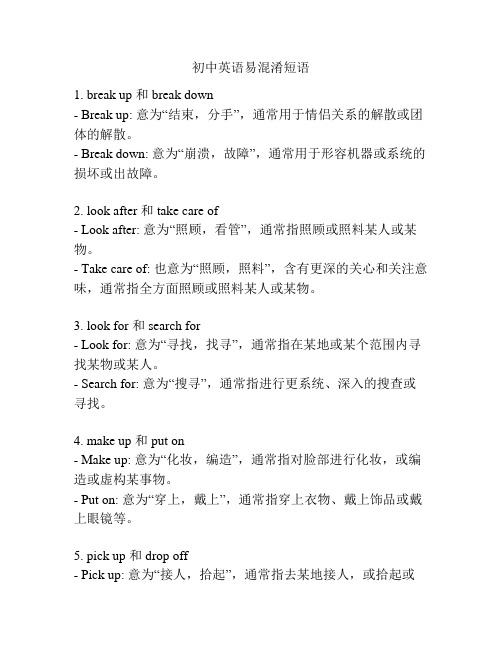
初中英语易混淆短语
1. break up 和 break down
- Break up: 意为“结束,分手”,通常用于情侣关系的解散或团体的解散。
- Break down: 意为“崩溃,故障”,通常用于形容机器或系统的损坏或出故障。
2. look after 和 take care of
- Look after: 意为“照顾,看管”,通常指照顾或照料某人或某物。
- Take care of: 也意为“照顾,照料”,含有更深的关心和关注意味,通常指全方面照顾或照料某人或某物。
3. look for 和 search for
- Look for: 意为“寻找,找寻”,通常指在某地或某个范围内寻找某物或某人。
- Search for: 意为“搜寻”,通常指进行更系统、深入的搜查或寻找。
4. make up 和 put on
- Make up: 意为“化妆,编造”,通常指对脸部进行化妆,或编造或虚构某事物。
- Put on: 意为“穿上,戴上”,通常指穿上衣物、戴上饰品或戴上眼镜等。
5. pick up 和 drop off
- Pick up: 意为“接人,拾起”,通常指去某地接人,或拾起或
捡起某物。
- Drop off: 意为“送人,放下”,通常指把某人送到某地,或放下或丢下某物。
6. turn on 和 switch on
- Turn on: 意为“打开”,通常指打开电器或开关的动作。
- Switch on: 也意为“打开”,特别指通过切换开关打开电器或电源。
初中易混淆单词汇总
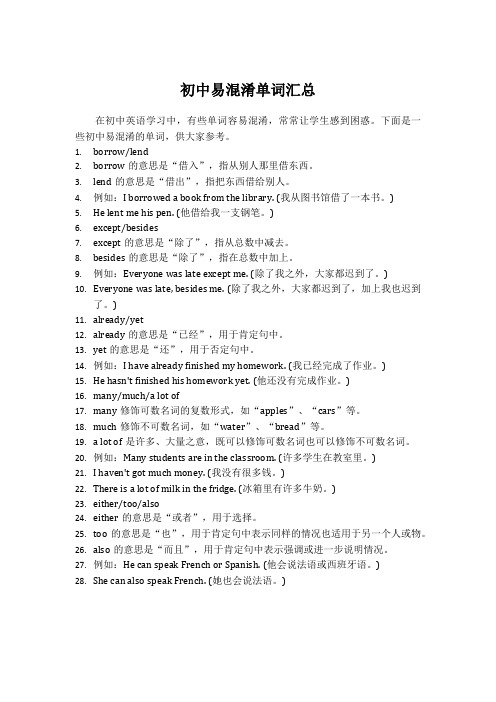
初中易混淆单词汇总在初中英语学习中,有些单词容易混淆,常常让学生感到困惑。
下面是一些初中易混淆的单词,供大家参考。
1.borrow/lend2.borrow的意思是“借入”,指从别人那里借东西。
3.lend的意思是“借出”,指把东西借给别人。
4.例如:I borrowed a book from the library. (我从图书馆借了一本书。
)5.He lent me his pen. (他借给我一支钢笔。
)6.except/besides7.except的意思是“除了”,指从总数中减去。
8.besides的意思是“除了”,指在总数中加上。
9.例如:Everyone was late except me. (除了我之外,大家都迟到了。
)10.Everyone was late, besides me. (除了我之外,大家都迟到了,加上我也迟到了。
)11.already/yet12.already的意思是“已经”,用于肯定句中。
13.yet的意思是“还”,用于否定句中。
14.例如:I have already finished my homework. (我已经完成了作业。
)15.He hasn't finished his homework yet. (他还没有完成作业。
)16.many/much/a lot of17.many修饰可数名词的复数形式,如“apples”、“cars”等。
18.much修饰不可数名词,如“water”、“bread”等。
19. a lot of是许多、大量之意,既可以修饰可数名词也可以修饰不可数名词。
20.例如:Many students are in the classroom. (许多学生在教室里。
)21.I haven't got much money. (我没有很多钱。
)22.There is a lot of milk in the fridge. (冰箱里有许多牛奶。
151组高中英语常见易混淆次总结
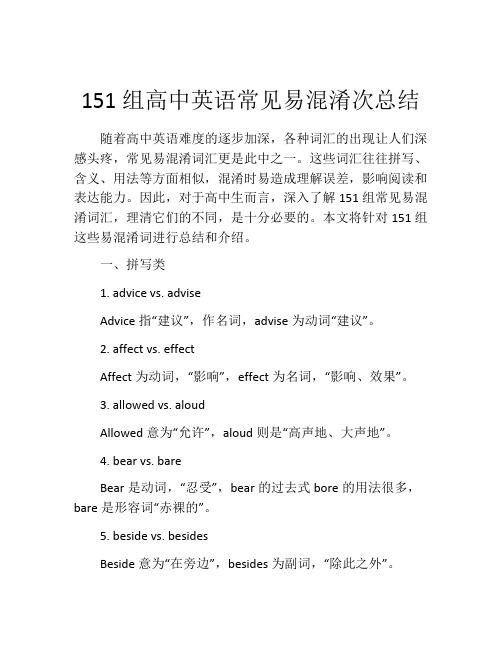
151组高中英语常见易混淆次总结随着高中英语难度的逐步加深,各种词汇的出现让人们深感头疼,常见易混淆词汇更是此中之一。
这些词汇往往拼写、含义、用法等方面相似,混淆时易造成理解误差,影响阅读和表达能力。
因此,对于高中生而言,深入了解151组常见易混淆词汇,理清它们的不同,是十分必要的。
本文将针对151组这些易混淆词进行总结和介绍。
一、拼写类1. advice vs. adviseAdvice指“建议”,作名词,advise为动词“建议”。
2. affect vs. effectAffect为动词,“影响”,effect为名词,“影响、效果”。
3. allowed vs. aloudAllowed意为“允许”,aloud则是“高声地、大声地”。
4. bear vs. bareBear是动词,“忍受”,bear的过去式bore的用法很多,bare是形容词“赤裸的”。
5. beside vs. besidesBeside意为“在旁边”,besides为副词,“除此之外”。
6. capital vs. capitolCapital指“首都”,也可指“资本、大写字母”,capitol指“国会大厦”。
7. compliment vs. complementCompliment为名词,“称赞、恭维”,complement为动词,“补充、补足;名词”,意为“补足的东西、补语”。
8. council vs. counselCouncil为名词,“委员会、议会”,counsel为名词,“建议、律师、鼓励、劝告”;动词“建议、劝告”。
9. discreet vs. discreteDiscreet意为“谨慎的、小心的、慎重的”,discrete 意为“离散的、不连续的”。
10. principal vs. principlePrincipal为名词,“负责人、校长、本金”,也可作形容词,“主要的、首要的、本金的”,principle指“原则、原理”。
高中容易混淆词汇

1.abroad到国外;短语: go abroad 去国外She worked abroad for a year. 她在国外工作了一年。
broad宽阔的Eg. His shoulders were broad and his waist narrow. 他细腰宽肩膀。
board n. 板; 董事会; 甲板; 膳食;vt. 上(船、车或飞机); 收费供…膳宿;aboard prep. 在(船、飞机、车)上; adv. 在船(或飞机、车)上。
2.across介词,表面穿过 walk across the roadcross动词 cross the roadthrough介词,空间穿过 go through the windowpast介词,经过 walk past the post officepass动词 pass the test3.alive [əˈlaɪv] 活着的 I am still alive.live[laɪv]现场直播 Murray was a guest on a live radio show. 默里在一个直播的电台节目里当嘉宾。
居住 live in the citylively [laɪvli]活泼的 make his class lively and interestingliving make a living/ a living room4.lonely孤独 feel lonelyalone独自 live aloneThough he lived alone in his small wooden house, he didn’t feel lonely. along沿着 walk along the street5.asleep睡着的 fall asleepsleepy困倦的feel sleepy6.fall落下,倒 fall down,fall behind 落后fell fall的过去式 (fall—fell---fallen)feel -felt-felt 觉得 feel sleepy/tired---过去式felt7.bad形容词,badly副词,不好,但与need, want, require连用为"很,非常" go bad(变质) I need the book badly.(我很需要那本书)badly—worseJim acted badly, but Tom did worse.well—better8.8.both两者都 Both of his parents are workers.all三者以上都 All of my classmates are from China.neither两者都不 Neither of my hands is clean.none没有一个(三者及以上)None of the four apples is/are red. nothing什么都没有 There's nothing in the fridge.9.care:take care ofcareful形,仔细的be careful with firecarefully副,仔细地 listen carefullycareless形,粗心的 a careless studentcarelessly副,粗心地drive carelesslycarelessness名,粗心 Your carelessness led to the mistake. 10.close动词,关闭 close the door形,亲密的 my closest friendclosed形,关着的 keep the door closedclosely副,密切地 work closely with us11.dead形,死的 have been deaddie动,死亡 die of hungerdeath名,死亡 the death of his pet makes him so sad.12.especially副,尤其 He is good at all subjects, especially maths.specially副,专门 The pen is specially designed for the boy.special形,特殊的 a special day13. beside,besides, except, except forbeside prep.在......旁边 I moved from behind my desk to sit beside her. 我从桌子后面走到她身边坐了下来。
初中英语极易混淆的短语
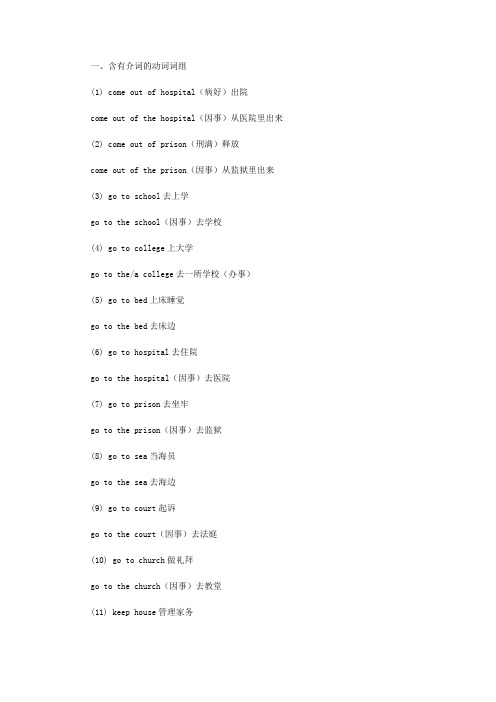
一、含有介词的动词词组(1) come out of hospital(病好)出院come out of the hospital(因事)从医院里出来(2) come out of prison(刑满)释放come out of the prison(因事)从监狱里出来(3) go to school去上学go to the school(因事)去学校(4) go to college上大学go to the/a college去一所学校(办事)(5) go to bed上床睡觉go to the bed去床边(6) go to hospital去住院go to the hospital(因事)去医院(7) go to prison去坐牢go to the prison(因事)去监狱(8) go to sea当海员go to the sea去海边(9) go to court起诉go to the court(因事)去法庭(10) go to church做礼拜go to the church(因事)去教堂(11) keep house管理家务keep the house守在家里(12) take place发生take the place代替二、有无冠词,意义无多大区别的介词词组(1)at(the)most至多(2)at(the)first起初(3)all(the)day 整天(4)catch(a)cold感冒(5)in(the)future 将来(6)in(the)memory of纪念(7)go to(the)office 上班,去办公室(8)go to(the)market 赶集,去市场(9)on(a)holiday 在度假(10)(the)day before yesterday 前天(11)(the)most of 大多数(12)with(a)smiling face 面带微笑。
中考易混淆单词词组汇总
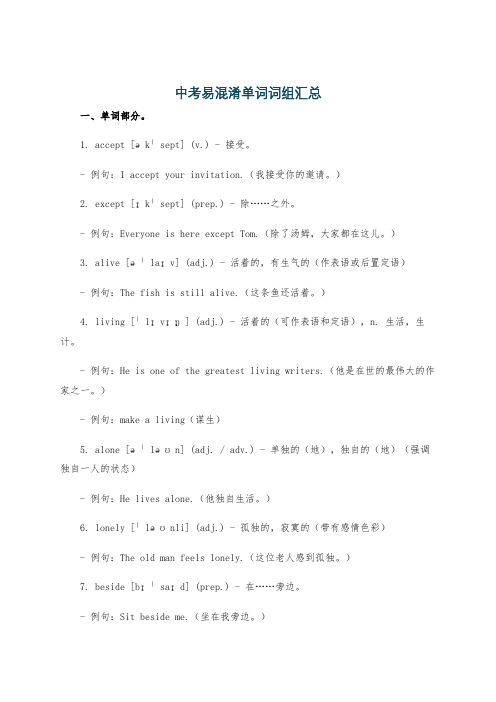
中考易混淆单词词组汇总一、单词部分。
1. accept [əkˈsept] (v.) - 接受。
- 例句:I accept your invitation.(我接受你的邀请。
)2. except [ɪkˈsept] (prep.) - 除……之外。
- 例句:Everyone is here except Tom.(除了汤姆,大家都在这儿。
)3. alive [əˈlaɪv] (adj.) - 活着的,有生气的(作表语或后置定语)- 例句:The fish is still alive.(这条鱼还活着。
)4. living [ˈlɪvɪŋ] (adj.) - 活着的(可作表语和定语),n. 生活,生计。
- 例句:He is one of the greatest living writers.(他是在世的最伟大的作家之一。
)- 例句:make a living(谋生)5. alone [əˈləʊn] (adj. / adv.) - 单独的(地),独自的(地)(强调独自一人的状态)- 例句:He lives alone.(他独自生活。
)6. lonely [ˈləʊnli] (adj.) - 孤独的,寂寞的(带有感情色彩)- 例句:The old man feels lonely.(这位老人感到孤独。
)7. beside [bɪˈsaɪd] (prep.) - 在……旁边。
- 例句:Sit beside me.(坐在我旁边。
)8. besides [bɪˈsaɪdz] (prep. / adv.) - 除……之外(还有),此外。
- 例句:Besides English, we also learn French.(除了英语,我们还学法语。
)- 例句:I don't like this dress. Besides, it's too expensive.(我不喜欢这条裙子。
它太贵了。
易混淆的英文词组
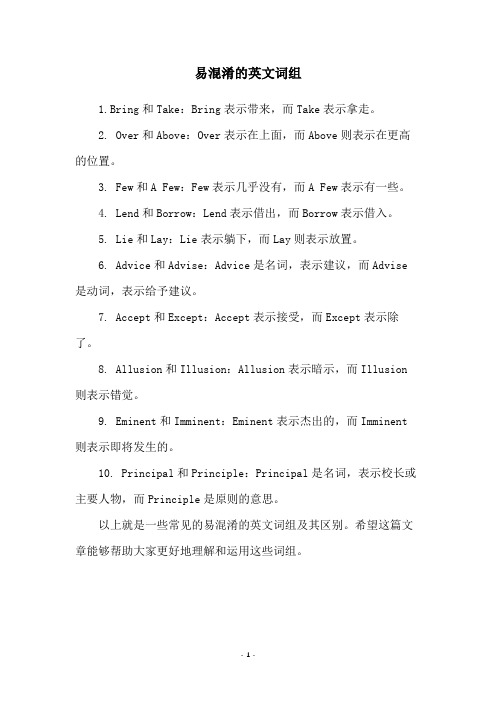
易混淆的英文词组
1.Bring和Take:Bring表示带来,而Take表示拿走。
2. Over和Above:Over表示在上面,而Above则表示在更高的位置。
3. Few和A Few:Few表示几乎没有,而A Few表示有一些。
4. Lend和Borrow:Lend表示借出,而Borrow表示借入。
5. Lie和Lay:Lie表示躺下,而Lay则表示放置。
6. Advice和Advise:Advice是名词,表示建议,而Advise 是动词,表示给予建议。
7. Accept和Except:Accept表示接受,而Except表示除了。
8. Allusion和Illusion:Allusion表示暗示,而Illusion 则表示错觉。
9. Eminent和Imminent:Eminent表示杰出的,而Imminent 则表示即将发生的。
10. Principal和Principle:Principal是名词,表示校长或主要人物,而Principle是原则的意思。
以上就是一些常见的易混淆的英文词组及其区别。
希望这篇文章能够帮助大家更好地理解和运用这些词组。
- 1 -。
20个容易混淆的英文单词
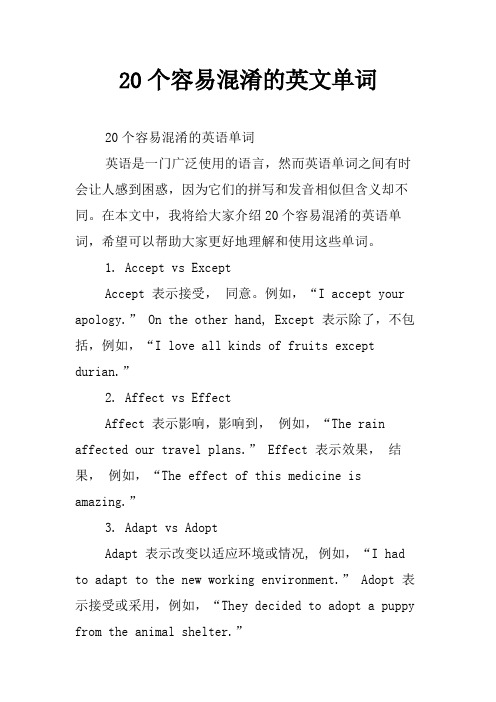
20个容易混淆的英文单词20个容易混淆的英语单词英语是一门广泛使用的语言,然而英语单词之间有时会让人感到困惑,因为它们的拼写和发音相似但含义却不同。
在本文中,我将给大家介绍20个容易混淆的英语单词,希望可以帮助大家更好地理解和使用这些单词。
1. Accept vs ExceptAccept 表示接受,同意。
例如,“I accept your apology.” On the other hand, Except 表示除了,不包括,例如,“I love all kinds of fruits except durian.”2. Affect vs EffectAffect 表示影响,影响到,例如,“The rain affected our travel plans.” Effect 表示效果,结果,例如,“The effect of this medicine is amazing.”3. Adapt vs AdoptAdapt 表示改变以适应环境或情况, 例如,“I had to adapt to the new working environment.” Adopt 表示接受或采用,例如,“They decided to adopt a puppy from the animal shelter.”4. Advice vs AdviseAdvice 是名词, 意思是建议。
例如,“She gave me some good advice about how to prepare for the exam.” Advise 是动词,意思是建议,例如,“I would advise you to take the train instead of driving.”5. Compliment vs ComplementCompliment 表示赞美或恭维某人,例如,“She received many compliments on her new hairstyle.” Complement 表示补充或完善,例如,“The red wine complements the beef dish perfectly.”6. Desert vs DessertDesert 是沙漠的意思,例如,“The Sahara Desert is the largest desert in the world.” Dessert 是甜点或果酱,例如,“I ordered chocolate cake for dessert.”7. Fewer vs LessFewer 是用于可数名词的数量, 指数量更少,例如,“There are fewer people in the library today than yesterday.” Less 是用于不可数名词,表示数量更少,例如,“I need less sugar in my coffee.”8. Imply vs InferImply 是表示暗示或表达某种意思,例如,“She implied that she is not interested in going outwith him.” Infer 是由已知事实推断出结论,例如,“She inferred from his expression that he was not happy.”9. Its vs It’sIts 是形容词性物主代词,意思是属于它的, 例如,“The cat licked its paws.” It's 是缩写,意思是它是,例如,“ It's a beautiful day today.”10. Loose vs LoseLoose 是形容词,表示松的,例如,“These pants are too loose for me.” Lose 是动词, 意思是失去,例如,“I don't want to lose my keys again.”11. Principal vs PrinciplePrincipal 是名词, 表示校长或负责人, 例如,“The new principal of our school is very str ict.” Principle 是名词, 表示基本原则或信念,例如,“I believe in the principle of honesty.”12. Stationary vs StationeryStationery 是文具的意思,例如,“I need to buy some stationery for school.” Stationary 是形容词,表示不动的,例如,“The car was stationary at the traffic light.”13. Than vs ThenThan 是用于比较的介词,例如,“She is taller than her sister.” Then 是表示时间或顺序的副词,例如,“I will finish my homework first, then I will watch TV.”14. Their vs They're vs ThereTheir 是形容词性物主代词,意思是他们的,例如,“Their car is parked in the driveway.” They're 是缩写,意思是他们是,例如,“They'r e going to the beach this weekend.” There 是副词,意思是那里或有,例如,“There is a cat on the roof.”15. To vs TooTo 是介词,在动词后面使用,例如,“I am going to the store.” Too 是副词, 表示过度或也,例如,“It's too hot outside.”16. Weather vs WhetherWeather 是天气的意思, 例如,“The weather is perfect for hiking.” Whether 是连词,是否的意思, 例如,“I'm not sure whether I should take the job or not.”17. Who vs WhomWho 是指代主语, 例如,“Who is that girl over there?” Whom 是指代宾语,例如,“Whom did you give the book to?”18. Your vs You'reYour 是形容词性物主代词,意思是你的,例如,“Your shoes are nice.” You're 是缩写,意思是你是,例如,“You're so kind.”19. Bear vs BareBear 是名词和动词,意思是熊和忍受,例如,“The bear is in the forest.” “I can't bear the pain.” Bare 是形容词,意思是裸露的,例如,“She walked on the beach with bare feet.”20. Farther vs FurtherFarther 表示物理距离上的更远,例如,“I can thro w the ball farther than you can.” Further 表示程度或数量的更多,例如,“We need to do further research on this topic.”总结以上是20个容易混淆的英语单词,它们的意思相似但又有差距,因此在使用时需要特别留意。
日常英语中易混淆的词或短语

Abut/About通常在表达“to border”或“to lie next to”的意思时使用动词“abut”。
在表达“almost”或“nearly”的意思时使用副词“about”。
Accept/Except在表达“to receive”、“to believe”或“to understand”的意思时使用动词“accept”。
例如,“She accepted the explanation”。
在表达“to the exclusion of”的意思时使用介词“except”。
例如,“Everyone is going except Jenny”。
Ad/Add在表示“广告”的意思时使用名词“ad”。
使用动词“add”表示“to combine”或“to expand”。
Adept/Adapt通常,使用形容词“adept”表示“skilled”。
使用动词“adapt”表示“to adjust”。
Adept/Adopt通常,使用形容词“adept”表示“skilled”。
使用动词“adopt”表示“to take in”、“to take up”或“to vote for”。
Ads/Adds使用名词“ads”表示“广告”。
使用动词“adds”表示“combines”或“expands”。
Advice/Advise通常,使用名词“advice”表示“suggestion”或“guidance”,例如,“The manager gave Jenny advice”。
使用动词“advise”表示“to suggest”或“to give advice to”,例如,“Will you advise me before I go into the meeting?”。
Aid/Aide通常,使用名词或动词“aid”表示“help”或“assistance”。
使用名词“aide”表示“a helper”。
Ail/Ale通常,使用动词“ail”表示“to feel unwell”或“to have pain”。
易混淆英语词汇

易混淆英语词汇一、accept([əkˈsept],动词)和except([ɪkˈsept],介词/连词)1. accept.- 意思:接受;认可。
例如:I accept your invitation.(我接受你的邀请。
)2. except.- 意思:除……之外。
例如:Everyone went to the party except Tom.(除了汤姆,每个人都去参加聚会了。
)二、affect([əˈfekt],动词)和effect([ɪˈfekt],名词;[ɪˈfekt],动词)1. affect.- 意思:影响;使感动。
例如:The bad weather affected our trip.(恶劣的天气影响了我们的旅行。
)2. effect(名词)- 意思:影响;效果。
例如:The medicine has a good effect on my illness.(这种药对我的病有很好的效果。
)- effect(动词)- 意思:使发生;实现。
例如:The new policy will effect great changes in our company.(新政策将使我们公司发生巨大的变化。
)三、advice([ədˈvaɪs],名词)和advise([ədˈvaɪz],动词)1. advice.- 意思:建议;劝告(是不可数名词)。
例如:Can you give me some advice?(你能给我一些建议吗?)2. advise.- 意思:建议;劝告。
例如:I advise you to study hard.(我建议你努力学习。
)四、beside([bɪˈsaɪd],介词)和besides([bɪˈsaɪdz],介词/副词)1. beside.- 意思:在……旁边。
例如:He sat beside me.(他坐在我旁边。
)2. besides(介词)- 意思:除……之外(还有)。
初中英语易混淆短语
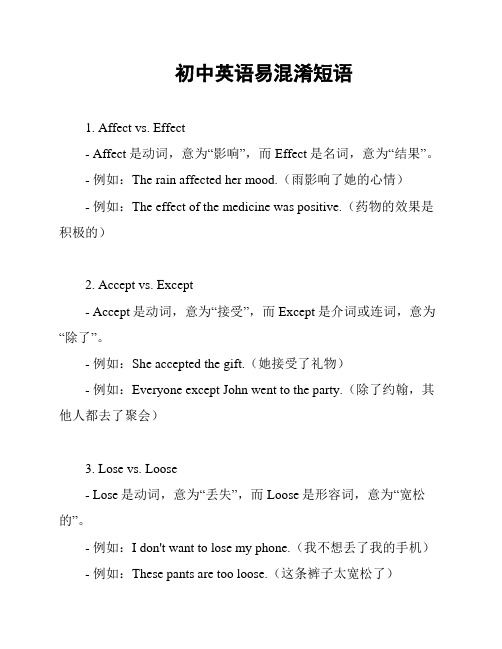
初中英语易混淆短语1. Affect vs. Effect- Affect是动词,意为“影响”,而Effect是名词,意为“结果”。
- 例如:The rain affected her mood.(雨影响了她的心情)- 例如:The effect of the medicine was positive.(药物的效果是积极的)2. Accept vs. Except- Accept是动词,意为“接受”,而Except是介词或连词,意为“除了”。
- 例如:She accepted the gift.(她接受了礼物)- 例如:Everyone except John went to the party.(除了约翰,其他人都去了聚会)3. Lose vs. Loose- Lose是动词,意为“丢失”,而Loose是形容词,意为“宽松的”。
- 例如:I don't want to lose my phone.(我不想丢了我的手机)- 例如:These pants are too loose.(这条裤子太宽松了)4. Principal vs. Principle- Principal是名词,意为“校长”或“主要的”,而Principle是名词,意为“原则”。
- 例如:The principal greeted the students in the morning.(校长在早晨向学生们致意)- 例如:He believed in the principles of honesty and integrity.(他相信诚实和正直的原则)5. Site vs. Sight vs. Cite- Site是名词,意为“地点”或“场所”,Sight是名词,意为“视力”或“景色”,而Cite是动词,意为“引用”。
- 例如:They chose a beautiful site for their picnic.(他们选择了一个美丽的野餐地点)- 例如:Her sight has been deteriorating.(她的视力一直在恶化)- 例如:He cited several sources in his research paper.(他在研究论文中引用了几个来源)这些是初中英语中容易混淆的一些短语,希望对你有帮助。
- 1、下载文档前请自行甄别文档内容的完整性,平台不提供额外的编辑、内容补充、找答案等附加服务。
- 2、"仅部分预览"的文档,不可在线预览部分如存在完整性等问题,可反馈申请退款(可完整预览的文档不适用该条件!)。
- 3、如文档侵犯您的权益,请联系客服反馈,我们会尽快为您处理(人工客服工作时间:9:00-18:30)。
最易混淆的英语短语汇总
通过多年的英语教学经验发现,学生们在记忆类似的短语时经常混淆,释义混淆,用法混淆。
现在把这些短语总结出来,大家最好进行对比记忆,记忆效果会事半功倍。
第一组:three of us, the three of us
three of us 我们(不止三人)中的三个
the three of us 我们三个(就三人)
第二组:next year, the next year
next year 明年(表示将来的时间状语)
the next year 第二年(表示过去将来的时间状语)
第三组:at table, at the table
at table 在吃饭
at the table 在桌旁
第四组:in class, in the class
in class 在课上
in the class 在班级里
第五组:in place of, in the place of
in place of 代替
in the place of 在……地方
第六组:on fire, on the fire
on fire 着火
on the fire 在火上
第七组:in front of, in the front of
in front of 在……前面(范围外)
in the front of 在……前部(范围内)
第八组:day by day, day after day
day by day 一天天地(强调变化)
day after day 日复一日地(强调重复)
第九组:year after year, year by year
year after year 年复一年(强调重复)
year by year 年年;逐年(强调变化)
第十组:out of question, out of the question
out of question 毫无疑问的
out of the question 不可能的
第十一组:a number of, the number of
a number of 许多(谓语动词用复数)
the number of ……的数量(谓语动词用单数)
第十二组:for a moment, for the moment
for a moment 片刻;一会儿
for the moment 目前;暂时
第十三组:in a word, in words
in a word 总之;一句话
in words 口头上
第十四组:go to sea, go to the sea
go to sea 出航
go to the sea 去海边
第十五组:in charge of, in the charge of
in charge of 主管……;负责……
in the charge of 由……主管;由……负责
第十六组:the doctor and teacher, the doctor and the teacher the doctor and teacher 医生兼老师(一个人)
the doctor and the teacher 一个医生和一个老师(两个人)第十七组:no more than, not more than
no more than 仅仅
not more than 不超过
第十八组:at peace, in peace
at peace 处于和平/安静状态
in peace 和平地;安宁地
第十九组:in the air, on the air
in the air 即将发生
on the air 正在广播
第二十组:at the market, on the market
at the market 在市场上
on the market 在出售;可买到
第二十一组:in the sun, under the sun
in the sun 在阳光下
under the sun 在地球上;全世界
第二十二组:in / at the beginning, at the beginning of
in / at the beginning 在开始的时候
at the beginning of 在……开始
第二十三组:in a way, in the way, in sb’s way, on the way in a way 在某种程度上
in the way 挡道
in sb’s way 妨碍某人
on the way 在……的路上
第二十四组:give up, give in
give up 放弃
give in 屈服;让步。
